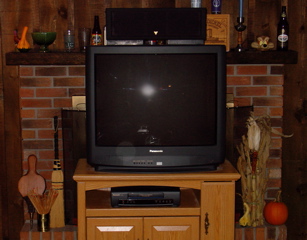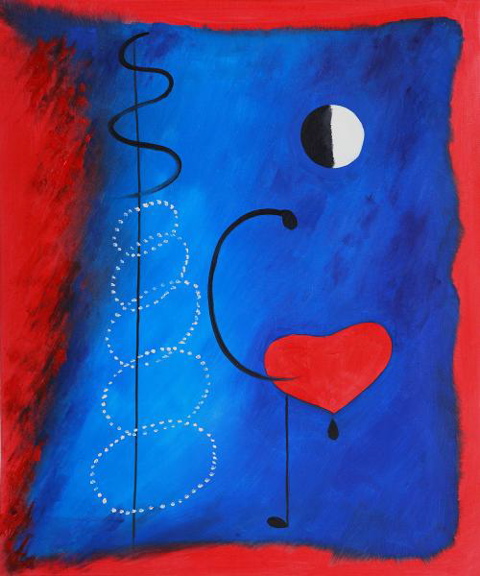copyright ⓒ 2010 Carol Jean Shriver
 "Neil's Room" photo copyright ⓒ 2010 Carol Jean Shriver
"Neil's Room" photo copyright ⓒ 2010 Carol Jean Shriver
The other night I was up extremely late watching a movie channel when, in the middle of a dramatic scene, my 32-inch Cathode Ray Tube television snapped "ZAP!" into my headphone encased ears and the screen went black with a thin white zig-zag bolt. The smell of burning wires lingered in the air.
I sat there staring at it with my headphones still on. I picked up the remote and pushed the buttons a few times as if giving it CPR from across the room. Nothing could bring it back.
It felt like I had received an important message from the beyond, but I was too dumbed down by my hours of watching television to grasp its meaning.
Unable to motivate myself to get up off the couch, I picked up a Time magazine, immediately flipped to the "Milestones" section, and read how Mitch Miller had died at the age of 99.
Mitch Miller. I had not thought of him in years. Black and white memories on a big black metal TV. I was very young. Sometimes the very young remember things the best.
Mitch Miller was a handsome man with a mustache and beard smiling broadly and waving a conductor's stick, a little ball bouncing on top of song lyrics at the bottom of the screen, the TV bursting with forthrightly happy and old fashioned songs that seemed old fashioned even to me then, but there was something really comforting about that.
I was a little girl and I loved Rock and Roll, but I also loved Mitch Miller. It seemed perfectly normal that Rock and Roll had nothing to do with Mitch Miller, and Mitch Miller had nothing to do with Rock and Roll. If you were unhappy about something, Mitch Miller's music would force you, against your will, to be happy.
I'm holding the Time magazine in the air in front of my face because I've put off getting reading glasses and I'm reading a "Milestone" about Mitch Miller that is written by a guy who starts off by admitting that Mitch Miller's music and TV show were "before my time" he writes. I'm really not that old and I remember Mitch Miller, so how could Time magazine not find someone my age or older to write about Mitch Miller's life?
I continue reading what seems like an adequate summary, but it feels like something I might read from Wikipedia. Or maybe it's just me. Maybe I've read too many Wikipedia articles.
Whatever is going on, reading this "Milestone" makes me feel sad, not because Mitch Miller has died, but because I feel so far away from what I am reading in the magazine. It's as if the author of the "Milestone" is writing about Mitch Miller from a million miles away.
The author calls the Sing Along With Mitch show "impossibly ancient and naive today."
What does "impossibly ancient" mean? Stonehenge seems ancient, but is it "impossibly" ancient? The writer draws a direct line of evolution from the Sing Along With Mitch show to American Idol. I must be "naive" because I don't watch American Idol.
But this past Spring and Summer, I spent months watching oil gush into the ocean in the Gulf of Mexico. I spent months watching oil experts and politicians and environmentalists. I watched birds smothering to death in oil. I watched a young woman hold back tears when a reporter asked her how she felt about the future. I watched people talk about toxic dispersants and how this is worse than the oil.
Looking for other things to watch, I watched how giant pythons and huge reptiles are multiplying and invading Florida because stupid people tried to make them pets. I watched how they're blowing off the tops of mountains in Appalachia to get to the coal.
I watched an HBO documentary called "Gasland" which explored how hydraulic fracturing, or "fracking," to get natural gas out of the earth's bedrock, decimates large areas of the surface of the land and contaminates ground water.
People who allowed the gas companies to drill on their land can now light their kitchen faucets on fire. So these people don't use their plumbing anymore. The gas company remedied the problem by providing them with a big tank of water in their yard.
Other people who cannot light their faucets on fire worry about the hundreds of unknown (even to government authorities) chemicals that were pumped deep into the earth near their homes during the fracking process, and if those chemicals might make them sick someday. Some of these people are already getting sick, but nobody cares because they are just plain folk who like living in rural areas.
I watched how these huge gas companies have already crossed the border from Pennsylvania into New York State and are making their way east. They are hell bent on drilling for natural gas in the Catskills, north of New York City where all of New York City's water comes from.
The looming threat of contamination of the water supply to six million people in the New York City area is even more disturbing to me than the oil and toxic dispersants in the Gulf because no one seems to know about it.
Whenever I try to tell people in New York City about this threat to New York City's water supply, their eyes glaze over. There seems to be a disconnect, as if their water does not come from the earth, but originates from some mystery place in "The City," and "The City" would never let anything bad happen to its water.
I feel like I'm talking to people from a million miles away. They see my mouth move, but they cannot hear what I am saying. My voice is drowned out by all the information that is already in their heads. How can I get angry at these people when they are too busy to watch something on TV that I had the time to watch?
After I watched "Gasland" on HBO I wanted to get off the couch and start an awareness campaign. Instead, I got on the Internet and wrote to Mayor Bloomberg's office, something I have never done. A few days later, I received a response: a reassuring, well composed letter, so I can't be the only one who wrote his office about this threat to New York City's water.
I searched the Internet and found an organization in the Catskills that is trying to stop the gas companies from drilling in the Catskills. This organization is aimed at people who live in the Catskills. I wondered why they aren't alerting all these unaware city people here in New York City that their water is in danger. I signed up for their newsletter. I found out that many people in high New York State political offices support the gas drilling because it would bring billions of dollars to New York State.
I wouldn't know any of this if I had not been watching my TV. But I wouldn't know any of this if I had only been watching my local news here in New York City, or the SyFy channel.
After I learned all I could about gas drilling in the Catskills, I went back to watching TV.
I started staying up really late watching obscure movies that they don't show except late at night. I couldn't stop watching these movies, night after night. The more obscure the better. I wasn't sure if I was looking for something or running away. It felt like I might be doing both at the same time.
One night I watched a movie called "Blindness." Everyone in the world suddenly goes blind, except for one woman. It made me feel better for awhile. I highly recommend this movie.
The very long and extremely hot summer ended with a tornado in New York City. Countless tall beautiful trees got pulled up by their roots in my neighborhood. My neighborhood looked like those neighborhoods that get on TV after a bad storm. After months of watching far too much TV, I watched my torn up neighborhood on TV.
I would love to travel back in time to when Mitch Miller was on TV. Things seemed simpler then. There were a lot of horrible things going on then too, but the horrible things were treated with more respect. People felt like they could trust the news. News was called "news" and not "the media." Look those words up in the dictionary. There is a vast difference between "news" and "media."
Of course when we look back now at what was really happening, most people, including journalists and reporters, were ignorant about many things.
For example, only a tiny minority really believed we could destroy the planet simply by continuing to exist in the manner in which we are existing. Most people thought the only way the planet could be destroyed was by atomic bombs. Mention "the planet" back then, and people would think of getting off of it and going to the moon.
But Walter Cronkite was in Vietnam, reporting from the field until he could no longer, in good conscience, stay neutral about the war. The nearly universal trust that American people had for Walter Cronkite was a rare thing. Perhaps that is "impossibly ancient."
The nightly news was a regular account of how many American soldiers had died that day in Vietnam, and how many on the other side had been killed. The Vietnam War unfolded before our eyes on black and white TVs, but the death depicted at dinnertime was blood red. Perhaps that is "impossibly ancient."
I don't know what I was looking for this past Summer and Fall when I was watching so much TV, but I know it started with the oil gushing into the Gulf. I watched because I just wanted the oil to stop; and then I couldn't stop watching.
It was not a total waste of time. It was a lot like shopping. Lots and lots of junk, only a few useful things worth the time to search for, followed by a sense of exhausted emptiness, and an awareness of time I can never get back.
The writer in Time magazine sums up Mitch Miller's life by saying, "Long before the Internet and video games, Miller showed that TV was a device that people were going to want to interact with." The writer seems to make a direct connection from Mitch Miller on TV in the 1960s, to the Internet and video games.
Still holding the magazine in the air in front of my face I peered around it at the looming dead 32-inch TV in my living room. Interact? I think I just killed it.
I understand what the writer assigned to summarize Mitch Miller's life is attempting to say, but he is treading in deep water and can barely keep his face afloat; maybe too many hours on the Internet has dumbed him down the way too many hours watching TV dumbs me down.
You can watch TV on the Internet, but the Internet is not TV. Video games are not TV. I understand the urge to connect the dots between Then and Now, to create a history for what is happening now in order to make sense of it, and therefore try and give value to where we are now.
Appreciating what has come before, and how things have changed, is necessary for us to learn and evolve, but if you must attach something in the past to something in the present in order to give the thing in the present value, maybe the thing in the present is not as valuable as you thought it was. Value has its own voice.
Mitch was not into make-believe worlds in which people make believe they are make-believe people killing other make-believe people. Mitch's TV show did not appeal to mean-spirited competition, or seek to find the next new Pop Star. I doubt that Mitch would be pleased to see so many people, on the street, on the trains, on the buses, heads bowed down peering at little devices, their ear pieces engulfing them in their own private bubbles.
Mitch wanted us to sing along at home, together, as a family, with him. Mitch used the TV to reach out to us. He gave us a bouncing ball so we could keep track of the rhythm and the lyrics. He tried to bring a little lightness and happiness into our lives.
Mitch was into music, and he wanted us to be into it. When watching Mitch Miller on TV, it was easy to imagine many thousands of people watching the same show at the exact same moment. That's the way TV was, then.
Most households only had one TV and so everyone had to agree on what to watch, or just go along with the decision maker. If you wanted to watch, you had to pay attention. There was no recording the show, no rewind, no freeze frame.
In most areas of the country, there were only three channels, the three major networks, and so only three nightly news programs. You knew that maybe a third of all the people in the country who had a TV might be watching the same news as you at that exact moment.
With only three TV stations, there were a limited number of programs to watch. Some programs came on only once a week, like the Ed Sullivan Show. Sometimes the Ed Sullivan Show featured, to my delight, Rock and Roll. When the Beach Boys were on the Ed Sullivan Show it felt like the entire country was watching. When the Beatles were on the Ed Sullivan Show we knew the entire country was watching.
The entire country, in reality, was culturally imploding, or exploding, depending on your point of view. But at least we could all watch it together.
The TV connected everyone's family to millions of other families because everyone was watching the war in Vietnam, the riots and the fires in the cities, the assassinations that seemed to come one after another in quick succession, the funerals that followed the assassinations, the rockets being shot into orbit above the earth, the landing on the moon.
And for a few years, we also watched Mitch Miller try in earnest to counter the insanity which is, and always has been, the world.
We watched it all, together, then.
My fondest memory of Mitch Miller is listening to "The Bear Went Over The Mountain" while I rocked with innocent and wild joy as a child on my spring suspended "Old Brownie" rocking horse. The following version by Roger Mcguinn conjures for me the same warm and delightful feeling I had back then:
http://www.ibiblio.org/jimmy/folkden/php/search/
If anyone out there can find Mitch Miller doing "The Bear Went Over The Mountain" please leave the link in a comment below. So far, I can't find it. But I found Mitch on YouTube, minus the bouncing ball:
YouTube - Sing Along With Mitch (4 of 4)
 Saturday, March 18, 2017 at 12:27AM
Saturday, March 18, 2017 at 12:27AM 
 Blues Music,
Blues Music,  James Cotton
James Cotton 



